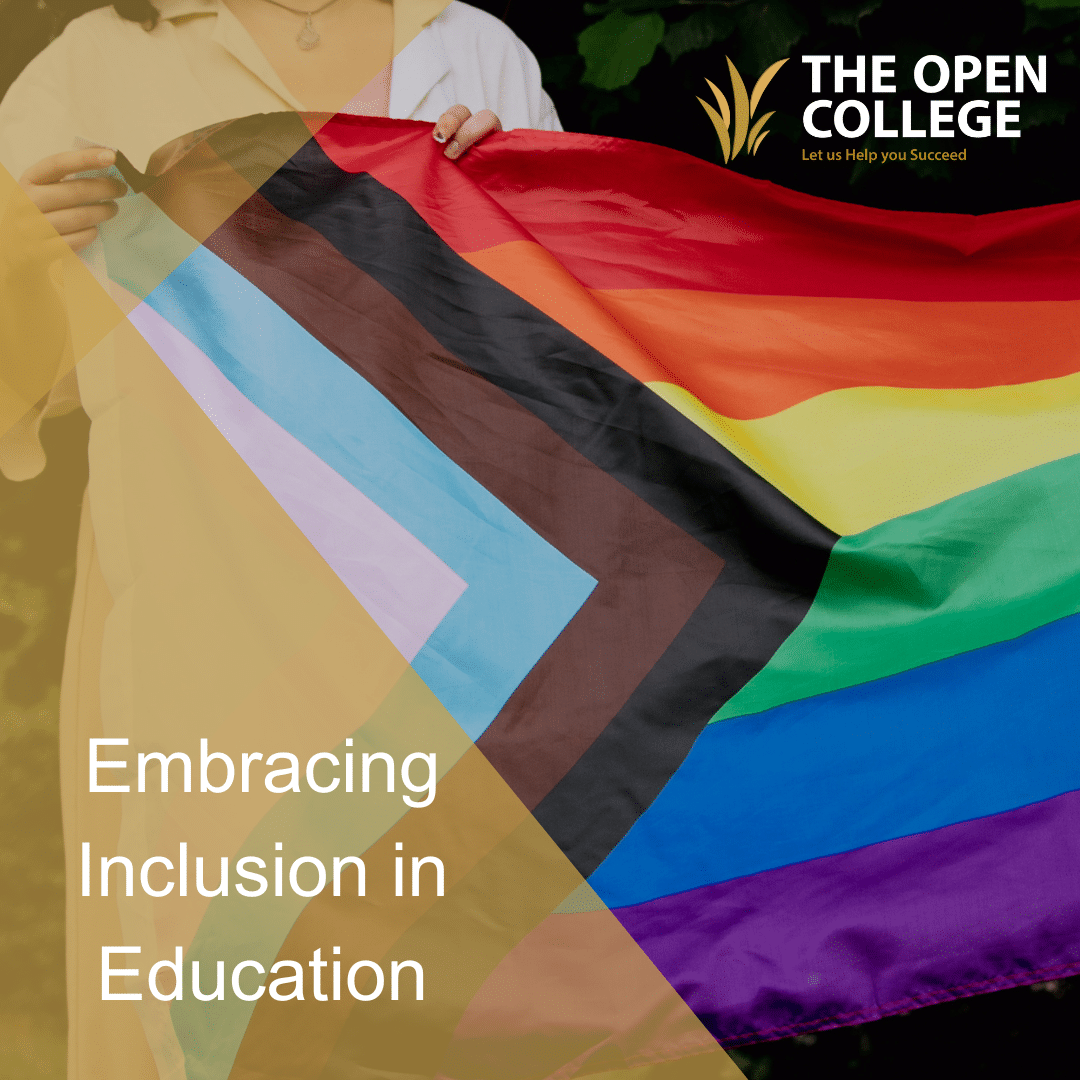Blog
1,250 New SNA Posts
Budget 2023 announced that there will be an additional 1,250 new SNA posts created in 2024.
This is now a great time to enrol on our online part-time QQI Special Needs Assistant (SNA) programmes.
All our SNA Level 5 & 6 courses are delivered with flexibility in mind and can be studied from a location that suits you, with no classes to attend.
Book your place today and gain your new SNA qualification in 8 weeks!
»Click here for further details on all our QQI Special Needs Assistant Courses
The Power of Online Learning for Career Advancement
In today’s fast paced and ever changing job market, the pursuit of career advancement has become more critical than ever. Professionals are constantly seeking ways to enhance their skill sets, stay competitive and climb the career ladder. One solution that has gained significant momentum in recent years is online learning. Whether you’re looking to gain new skills, switch careers, or move up in your current field, online learning can be a game changer.
Accessibility & Flexibility:
To start, we’ve said it before and we’ll continue preaching this because one of the biggest advantages of online learning is its accessibility. It erases geographical boundaries, the need to relocate and find ways to pay for crazy rent prices and makes it possible for individuals to access education and training from their own home. Whether you are a full time professional or a stay at home parent, online courses offer the flexibility to learn at your own pace and on your schedule. The accessibility and flexibility is vital for those who are balancing work, family and other commitments while striving for career advancement.
Diverse Skill Enhancement:
Online learning platforms offer a huge range of courses and programmes, covering almost every industry and skill imaginable. From technical skills like coding and data analysis to soft skills such as communication, there’s an online course to match your career goals. Granted, all the options may not be under the same roof but look around and see what suits you best. Acquiring new skills or deepening existing ones, makes you a more versatile and valuable asset in your field.
Cost-Effective Career Development:
Traditional forms of education, such as attending in person classes or workshops can be quite costly. Online courses often offer a more affordable alternative without compromising on quality.
Additionally, you can save on expenses like commuting and textbooks. For individuals looking to advance their careers without breaking the bank, online learning is an attractive option.
Seamless Career Transitions:
Changing careers or industries can be challenging, but online learning can facilitate a smoother transition. By acquiring a new skill in your desired area, you can bridge the gap between your current role and career aspirations. Many online programmes are designed to cater to individuals from diverse backgrounds, making career transitions more attainable.
Professional Networking:
This is a common misconception, but online learning doesn’t mean learning in isolation. Many online courses encourage collaboration, discussion and networking amongst peers. These interactions can lead to valuable connections with professionals in your industry. Building a strong professional network can open doors to guidance, mentorship and even career opportunities.
Credentials and Recognition:
It’s not a great feeling to spend time and energy completing a course for it to amount to nothing – unfortunately this is something that is associated with online courses quite often. But this is not the case. Online courses often culminate in certificates, degrees or industry recognised credentials (be sure to confirm this before registering anywhere). These tangible achievements can elevate your CV and marketability in the job market. Employers value candidates who invest in continuous learning, as it demonstrates a commitment to staying current in their field.
Online learning has emerged as a powerful tool for career advancement with many individuals and even companies availing of this opportunity. Additionally, forward thinking companies are increasingly recognising the value of online learning as a means to upskill their workforce, enhance performance and maintain a competitive edge.
So, whether you’re aiming for a promotion or a career change, online learning can help you achieve your goals.
Embrace the possibilities of online education and watch your career reach new heights.
Click here to view our full range of accredited Online Programmes.
Embracing Inclusion in Education
Education plays a pivotal role in shaping society’s values and beliefs. So, to build a more inclusive and accepting world, it is essential that educational institutions prioritise LGBTQ+ inclusion.
Inclusive education provides a platform for fostering acceptance and empathy among students. By integrating LGTBQ+ topics into curricula, schools can challenge stereotypes, debunk myths and promote understanding. Teaching students about diverse sexual orientations and gender identities cultivates a culture of respect, tolerance and compassion. When students learn about LGBTQ+ issues, they are more likely to become allies and advocates, dismantling discrimination and fostering a supportive environment.
Educational institutions should be safe havens for all students, regardless of their sexual orientation or gender identity. LGBTQ+ inclusive policies and programmes help create safer spaces where students can express themselves authentically without fear of bullying or exclusion. Implementing anti-discrimination policies, establishing gender neutral facilities and providing LGBTQ+ affirming resources and services, sends a powerful message of acceptance.
These measures, not only protect LGBTQ+ students but also educate peers in an environment that celebrates diversity.
Inclusive education empowers LGBTQ+ students by providing them with role models, resources and support. By integrating LGBTQ+ history, literature and contributions into the curriculum, students gain a deeper understanding of the community’s resilience and achievements.
When LGBTQ+ students see their identities represented and respected within the educational system, they are more likely to succeed academically and develop a positive self-image.
Training teachers on LGBTQ+ issues equips them with the knowledge and tools to create an inclusive learning environment.
It also encourages educators to examine their own biases (see our previous blog on Unconscious Bias in Education), challenge assumptions and address unconscious discrimination. By nurturing cultural competence, schools and higher education institutions prepare students for diverse society and empower them to become future leaders who champion equality and social justice.
LGBTQ+ inclusion in education goes beyond curriculum content, it includes creating safe spaces, empowering students and fostering cultural competence. By ensuring inclusion of the LGBTQ+ community, educational institutions take a vital step towards nurturing a generation of empathetic and accepting individuals who embrace and celebrate diversity.
Tackling Unconscious Bias in Further Education with Online Learning
As the CEO of an online college, I have seen firsthand (and I’m sure my colleagues would agree) how online learning can help combat unconscious bias in further education.
Unconscious bias is a pervasive problem in our society and it can have a significant impact on how people are treated in many areas of society. It can also lead to missed opportunities and lack of diversity in further education.
Unconscious bias is defined as a type of bias that we are not consciously aware of. It is an automatic and often subtle response to a situation, based on preconceived notions and stereotypes that we have developed over time and never challenged ourselves on. It impacts how we perceive and interact with others and can lead to unequal treatment of individuals based on things such as gender, race, ethnicity, religion, socio-economic status and/or other personal traits.
In the context of further and even let’s also say higher education, unconscious bias can lead to missed opportunities for students from underrepresented backgrounds.
For example, a teacher might unconsciously assume that a student from a particular racial or ethnic background is less capable of academic achievement and give that student less attention or support – sometimes the opposite is also true. Similarly, a teacher might unconsciously favour students who share their background and certain characteristics to unequal treatment of students based on their identity.
Online learning can help tackle unconscious bias in further & higher education in several ways.
Firstly, online learning is designed to be accessible to everyone, regardless of their backgrounds and characteristics. This means students from all walks of life have equal opportunities to participate in online courses and programmes without being subject to unconscious bias from teachers or administration.
Secondly, online courses can be used to provide training supports to teaching personnel to recognise unconscious bias in their teaching environment. Educators can learn strategies to promote a more inclusive learning environment and also connect with other educators and share best practices for promoting inclusivity and addressing bias in education.
Thirdly, online courses are designed to be self-paced which allows students to progress through the course at their own speed. This is particularly helpful to students who may need additional support or who may not have access to traditional classroom settings. eLearning allows students to connect with one another, fostering a sense of community and promoting a more inclusive learning experience.
Finally, e-learning can help promote a more diverse faculty with online courses which can be designed by educators from diverse backgrounds, including those who may not have had access to traditional academic pathways.
By promoting a more inclusive learning environment, providing training and support to educators and, providing a more equitable learning experience for learners, online learning can help tackle unconscious bias and promote a more diverse and inclusive learning experience.
As the CEO of an online college, I am committed to promoting inclusivity and addressing bias in education and I believe that online learning does play a critical role in achieving this goal.
Joe Walsh
Director
The Open College
Online Learning Helping You Succeed
One thing we love is to see at The Open College is our student population grow and every year we go from strength to strength.
The online learning route could be for many reasons of course, which expands far beyond practicality because online learning can also have a positive impact on personal lives so we wanted to look into why online learning is becoming more and more popular.
Firstly, online learning allows us to learn at our pace and in our own time. You can revise the content as often, as quickly and as slowly as you want.
This is something traditional classroom based learning cannot provide. This flexibility can be quite beneficial to people with busy schedules who would find it difficult to attend schedules classes regularly. By allowing learners to fit learning around their responsibilities and personal commitments, online learning can help reduce stress and improve work-life balance.
Secondly, online learning allows you to study from anywhere. With online courses you can access quality education from lead institutions and it won’t matter where you are based. However, saying this comes with a bit of a caveat because some QQI courses do have a work experience element to them which dictates that you should complete your placement in Ireland.
Thirdly, online learning does not always mean that you should complete courses with a career in mind but it could open the doorway to new career opportunities too. Online courses can be used to develop hobbies or learn new skills. This could be anything from, cooking and photography to coding and art. By doing this, you can boost your confidence and develop a greater sense of self.
Finally, online learning can be a fantastic way to improve your mental health and wellbeing. By learning new things, challenging yourself and achieving a personal goal, you can boost your self esteem and sense of accomplishment. You can even make new connections with people virtually if you live in a remote part of the world.
Education has many benefits, especially online learning. It doesn’t always mean learning for a job, it could be for learning out of curiosity or to satisfy a personal goal.
Whatever way you look at it, online learning is an investment into yourself.
AI in Education – Threat or Treat?
Artificial Intelligence (AI) has taken the world by storm and is rapidly transforming so many industries and education is no exception. The integration of AI in education has the potential to completely turn how we learn on its head. However, although the benefits are great, concerns are also springing up amongst education professionals about AI’s impact on the industry.
Let’s begin by looking at the benefits of AI being used in education.
- Personalised Learning: AI can personalize and tailor learning materials to suit and meet the needs of all students. Due to this learning can be more effective since students would be able to focus on certain areas which they need to improve on. Feedback can be instantaneous which will allow for quicker performance improvement.
- Accessibility: AI can provide remote and online learning opportunities which can be quite helpful to anybody living in remote areas. Access to course work can be at any time, day or night and students can learn based around their own unique schedule.
- Curriculum: AI can quickly generate curriculum content for educators which will mean teaching staff can spend more time teaching and less time researching and putting materials together.
- Human Bias: AI can work to reduce bias in education.
These are some benefits of AI, but as we all know not everything is always rosy and there are negative impacts of AI in education.
- Teachers: There is a fear that AI can replace human teachers, even though that could possibly be true, AI could never replace human touch, AI could never create a positive, creative and supportive learning environment like a good teacher can.
- Critical Thinking: AI could suppress critical thinking which is often an important skill taught in further and higher education and as a result stifle student’s thinking power overall.
- Human Interactions: AI limits our interpersonal connections and communications which is quite high up on Maslow’s Hierarchy of Needs.
- Digital Divide: Due to socio-economic reasons, AI may not be available to all who would like to use it.
- Integrity: An issue that further and higher education has been battling with for many decades and with the recent development of ChatGPT by OpenAI, the education industry has another battle to face of potential plagiarism which is not impossible, but quite difficult to detect.
Like most things in life, AI in education has its pros and cons. It’s extremely important to target the negatives and work on improvements in these areas. Additionally, it’s important to invest in training teachers to fully understand the AI systems so that they can use it effectively in their teaching.
Ultimately, AI is as good as the people behind it and the people that use it. It can significantly improve how we learn and teach and make education accessible for all.
And finally, as we touch on ChatGPT and if you are still not sure if it is as great and powerful as people make it out to be, ask yourself this – was this blog written by AI software like ChatGPT or just by a very skilled copywriter?
Joe Walsh
Director
The Open College
POBAL Funding – Applications for Learner Fund 4 is open till 28th October 2016
The Open College is approved to provide Pobal Funded Training for those who wish to complete the Level 5 and Level 6 Major Awards in Early Childhood Care & Education.
The Department of Children and Youth Affairs recently announced a 4th round of the Learner Fund. This fund is now open for applications and will remain open until 28th October 2016. All Childcare staff in Early Childcare centres in Ireland, are required to have at least a Level 5 approved qualification in Childcare and all Pre-school (ECCE) Room Leaders are required to hold a Level 6 approved qualification in Childcare.
2016 will see an expansion of the ECCE programme which will be made available to a wider age-range of preschoolers. This will result in additional demand for ECCE places, and many early years services will be planning to expand as a result.
The Open College, Ireland’s largest QQI course provider offers the approved QQI component and Major Award at Levels 5 and 6 which are suitable for both Early Childcare staff and Room Leaders/Supervisors.
Find out more about The Open College’s range of Childcare courses.
Click here for more information on POBAL Funding.



